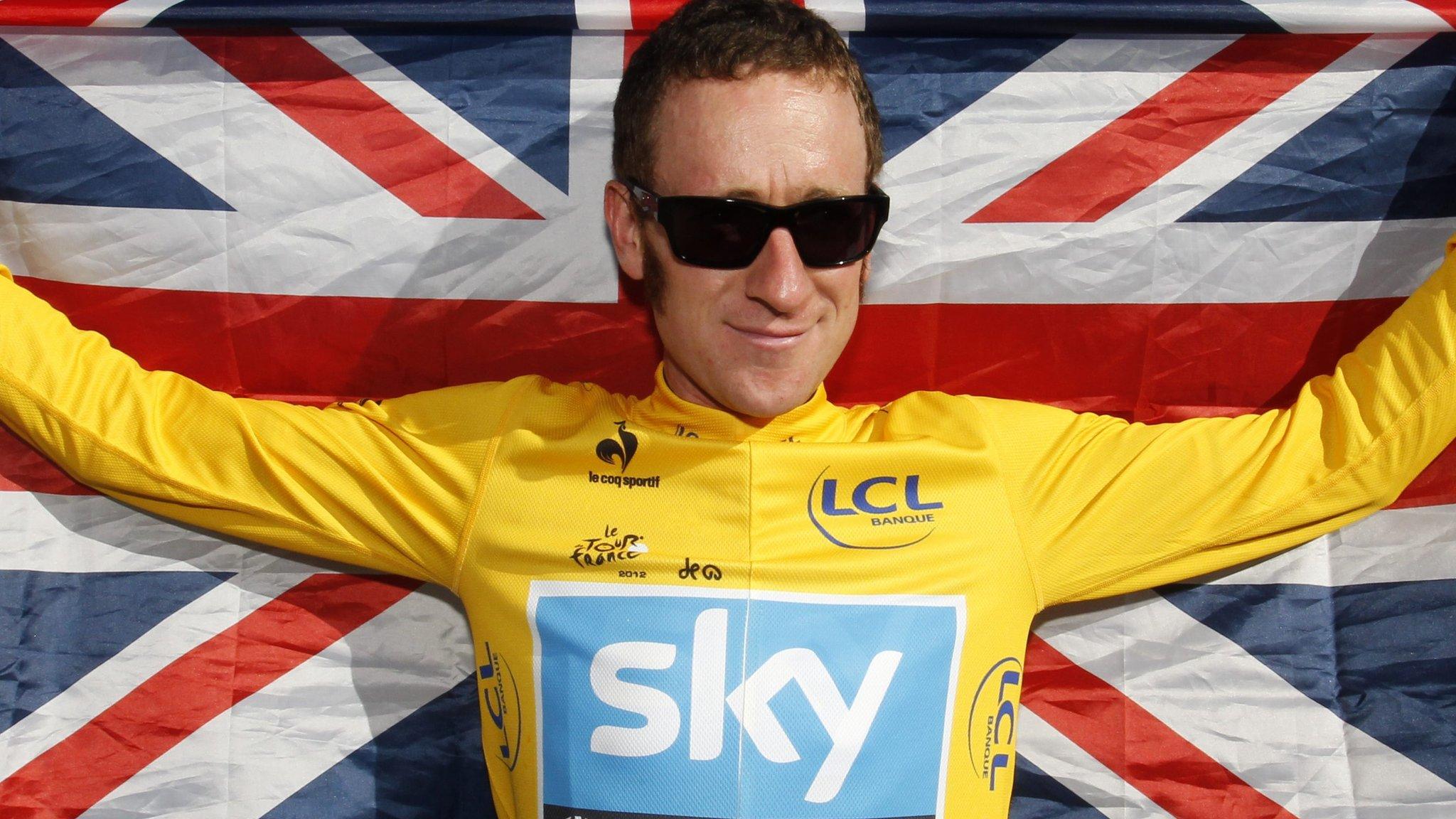Bradley Wiggins: British cycling great retires after winning five Olympic titles
- Published
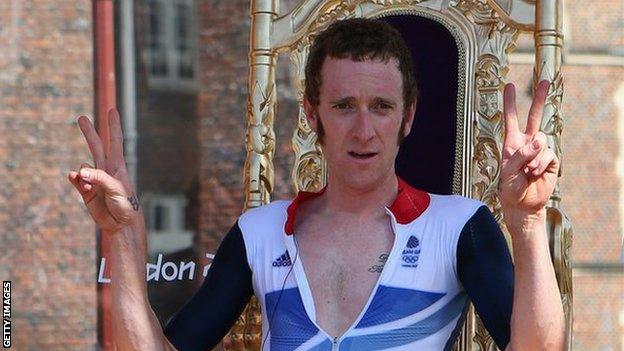
He swapped his saddle for a throne to celebrate his fourth Olympic title
Olympic champion. Tour de France winner. World record holder on the track. World titles on the track and road. A knighthood. Wiggomania. It has been quite a ride.
After almost two decades of professional pedalling around the roads and velodromes of the world, Sir Bradley Wiggins has announced his retirement at the age of 36.
Fittingly, the final race of his career ended up being in the town of his birth, Ghent, where he competed in a Six Day track event with long-time friend Mark Cavendish, who he partnered to a second world madison gold earlier this year.
Here we look back at the career of Britain's most decorated Olympian.
Wiggins' big wins
2000 - wins first Olympic medal, bronze in Sydney
2004 - first Briton to win three Olympic medals at same games since 1964
2008 - wins two gold medal at Beijing Olympics
2012 - first British winner of Tour de France
2012 - BBC Sports Personality of the Year winner
2012 - Velo d'Or winner (best cyclist of the year award)
2013 - knighted for services to cycling
2014 - world road time trial winner
2015 - sets world hour record on the track at 54.526km
2016 - wins team pursuit gold at Rio Olympics
Won eight world titles on the track and road
Britain's most decorated Olympian with five gold medals in his haul of eight
2012 - annus mirabilis
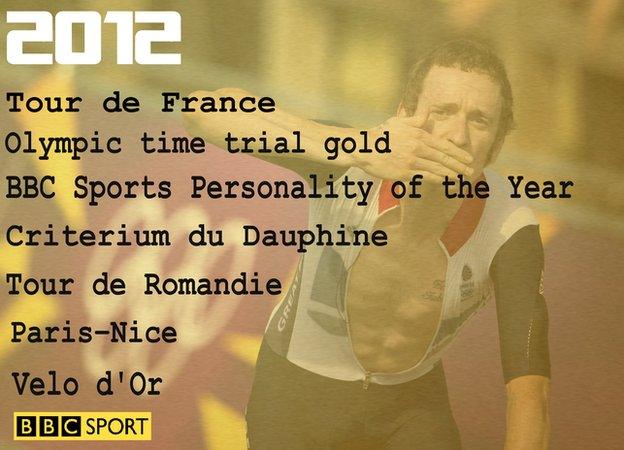
Wiggins' 2012 haul
The story of Wiggins' rise from north London schoolboy to Olympic champion has been well documented but it was in 2012 that he perhaps had his greatest year.
He was winning bike races all year before claiming the iconic Tour de France yellow jersey in July. Just 10 days after standing on top of the podium on the Champs Elysees in Paris, Wiggins raced around the streets of London to win Olympic time trial gold.
Wiggins' celebrity was secured in Britain not only by his superb victories, but by his cool, laid-back demeanour.
The trademark sideburns and his penchant for the mod style, made famous by bands such as The Who and The Jam, contributed to 'Wiggomania' in the summer of 2012, as did his vibe of working-class boy made good.
Wiggins teases 'Susan' Barker
His popularity with the British public was reflected by his BBC Sports Personality of the Year victory in 2012, when he cheekily referred to host Sue Barker as Susan. The following year Brad became Sir Bradley.
Arise Sir Wiggo
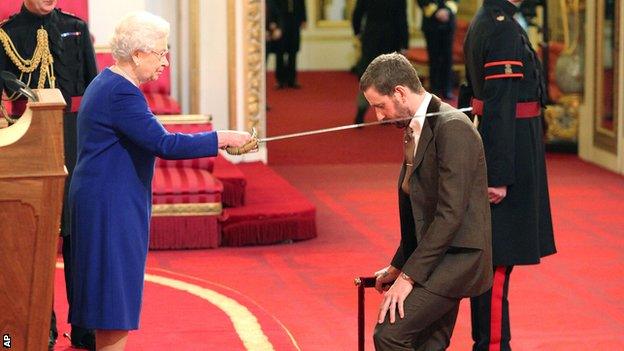
Wiggins was knighted by the Queen for services to cycling in December 2013
Wiggins was knighted by the Queen at Buckingham Palace in December 2013, for services to cycling.
Speaking at the time he said the title was an "incredible honour".
"It's quite humbling," he added. "I was talking to some of the other people getting stuff, and asking them what they've been honoured for, and they're historic things, ground-breaking sciences or whatever.
"I've won a bike race, you know, and I feel a little bit inferior to everyone, really."
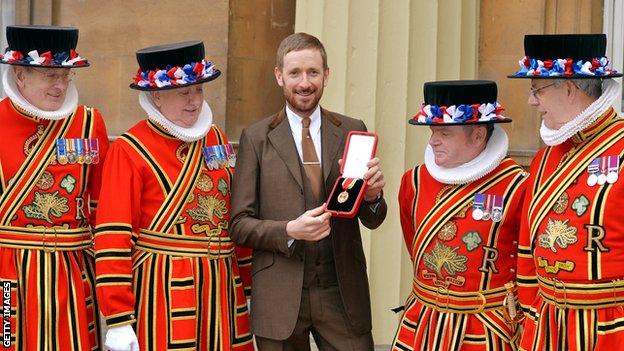
Wiggins with his knighthood at Buckingham Palace
The medals and the jerseys
Wiggins had already won team pursuit silver at the 1998 Commonwealth Games as an 18-year-old before he began to seep into the public consciousness with a bronze in the same event at the Sydney Olympics in 2000.
Sixteen years later, he teamed up with Ed Clancy, Owain Doull and Steven Burke to neatly bookend his career with team pursuit gold in Rio.
Fellow cyclists Sir Chris Hoy and Jason Kenny may have won six gold medals but neither can match Wiggins' total medal haul of eight - five gold, one silver and two bronze - or his versatility.
He won individual pursuit gold, team pursuit silver and madison bronze with Rob Hayles in Athens in 2004, becoming the first British athlete since Mary Rand in 1964 to win three medals at one Olympics.
Beijing 2008 produced double gold in the individual pursuit and team pursuit and, with 10 world track medals to his name, Wiggins opted to change discipline and prove his skills on the road. It was a spectacularly successful move.
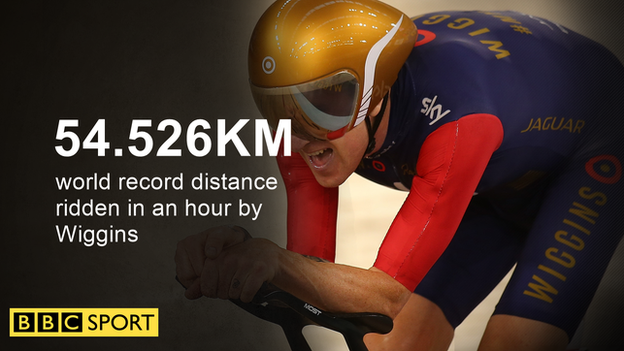
Wiggins set a new hour record in June 2015 at the former London Olympic velodrome
He finished fourth at the 2009 Tour de France - later revised to third after Lance Armstrong's disqualification for doping - and then joined Team Sky with team principal Sir Dave Brailsford declaring that a British rider would win the race within five years.
Wiggins delivered in 2012 and 10 days later became the only cyclist to win both the Tour and Olympic gold in the same year.
He also showed he was a team player, producing a blistering turn at the head of the race during the 2011 World Championship road race to help British team-mate Cavendish to victory.
But his relationship with Team Sky would become strained as Chris Froome's emergence pushed him to the sidelines, but he won the World Championships time trial title in 2014 before moving back to track racing and breaking the gruelling one-hour record.
Earlier this year he won a second madison track world title with long-time friend and team-mate Cavendish, before sealing his legacy as one of Britain's greatest ever Olympians by helping GB to team pursuit gold at Rio 2016, claiming the fifth gold of his career.
Controversy
Bradley Wiggins: 'This was about putting myself back on a level playing field'
Wiggins and Team Sky, the professional team he won the Tour with, were put under scrutiny in September 2016 for his use of therapeutic use exemptions (TUEs), after his confidential medical information was leaked by hackers 'Fancy Bears'.
The cyclist, an asthma sufferer, said he sought TUEs to "put himself back on a level playing field".
The TUEs were approved by British authorities and cycling's world governing body, the UCI.
There is no suggestion that either he, British Cycling or Team Sky, his former team, have broken any rules.
Team Sky boss Sir Dave Brailsford has also revealed the contents of a medical package delivered to the team on the final day of the 2011 Criterium du Dauphine.
The package, which was for Wiggins - who went on to win the seven-day race - contained the decongestant Fluimucil, which is legal in sport and "administered on a regular basis" Brailsford told MPs.
In his own words
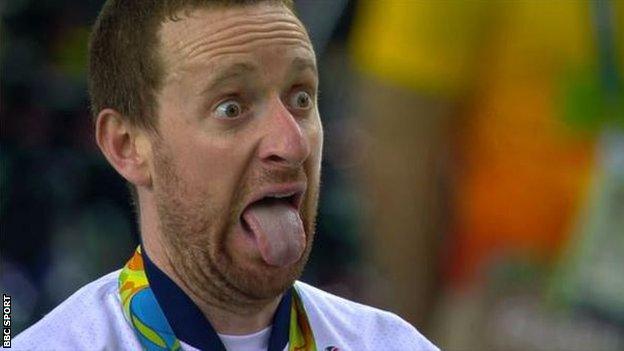
Wiggins celebrated his fifth Olympic gold on the podium in his own style...
After winning a fifth gold at Rio 2016: "It was gold or nothing. I'll be hungover tomorrow. My kids need a proper dad in their lives. My wife needs a proper husband. I wanted to go out on top, I'm not doing Tokyo 2020. I'm happy and content with everything I've achieved."
After breaking the UCI hour record in 2015: "That's the closest I'll ever come to knowing what it's like to have a baby. It was just torture."
After winning Olympic gold in 2012 in London: "It's the stuff of dreams. As a child, being a fan of the sport, I never imagined that one day I'd be in this position. Kids from Kilburn don't become favourite for the Tour de France. You're supposed to become a postman or a milkman or work in Ladbrokes."
On receiving a letter from the Queen after his 2012 win:, external "It's all very strange. My wife kept going on, ecstatic that the Queen had sent us a letter. I kept saying Johnny Marr (from 1980s indie band The Smiths) has sent me a message on Twitter.' But she said, 'It's the Queen.' I said, 'And this is Johnny Marr, Cath, come on.' I had a message from 'God', too, Robbie Fowler."
After winning the 2012 BBC Sports Personality of the Year: "Thank you to everyone who voted. We have had all that jungle stuff and X Factor in the last few weeks, so for people to pick up the phone and vote in half-an-hour, thank you very much.
"To be ahead of Jess [Ennis] and Andy [Murray], it's probably my greatest sporting achievement. The other stuff you can control, you can't control people voting for you.
"To my nan, the cheque is in the post because you pressed redial so many times."
Wiggins rocks Sports Personality party
After winning the 2012 Tour de France: "We're just going to draw the raffle numbers now. My old mother over there, her son's just won the Tour de France. Thank you everyone. Cheers. Have a safe journey home and don't get too drunk."
On cycling: "I love it. I'll always be riding my bike. I come from a cycling family. I'll probably be there in 20 years' time marshalling on the corner somewhere for a local 10km. I'll still be in a cycling club. It's pretty embedded."
On becoming famous after his Tour win: "I left home and nobody knew who I was, in the village even, bar a couple. And then I came back to this overwhelming adulation everywhere I go. It is fantastic, brilliant, it really is - but I wasn't quite expecting the reaction."
On his use of therapeutic use exemptions (TUEs): "This was to cure a medical condition. This wasn't about trying to find a way to gain an unfair advantage. This was about putting myself back on a level playing-field in order to compete at the highest level."
On retiring: "I have been lucky enough to live a dream and fulfil my childhood aspiration of making a living and a career out of the sport I fell in love with at the age of 12. What will stick with me forever is the support and love from the public though thick and thin, all as a result of riding a pushbike for a living. 2012 blew my mind."
A career in pictures
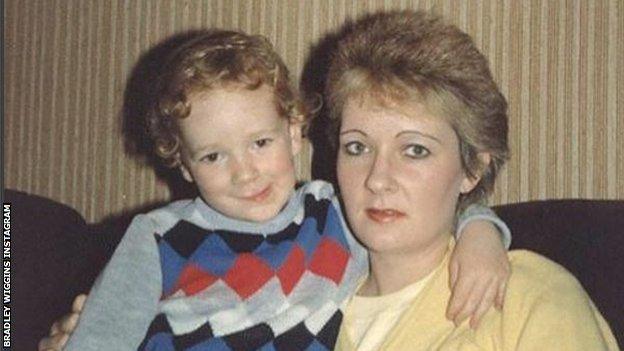
A young curly-haired Wiggins with his mum Linda
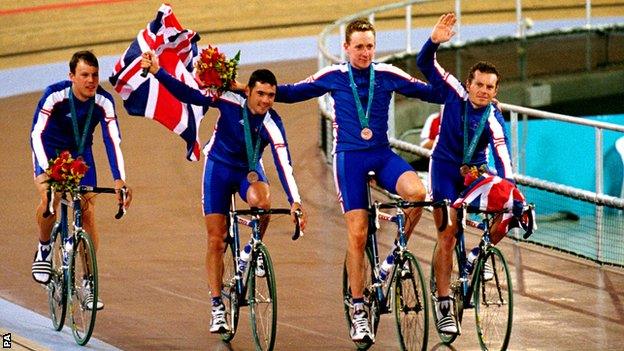
Wiggins wins his first Olympic medal, a bronze, at Sydney in 2000, alongside Paul Manning, Chris Newton and Bryan Steel
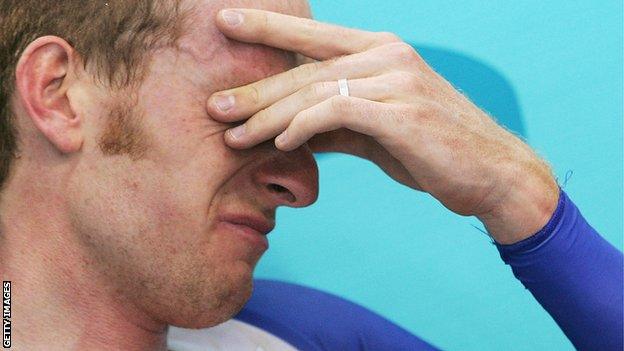
Four years later and there was a gold medal, in the individual pursuit, to celebrate at Athens 2004
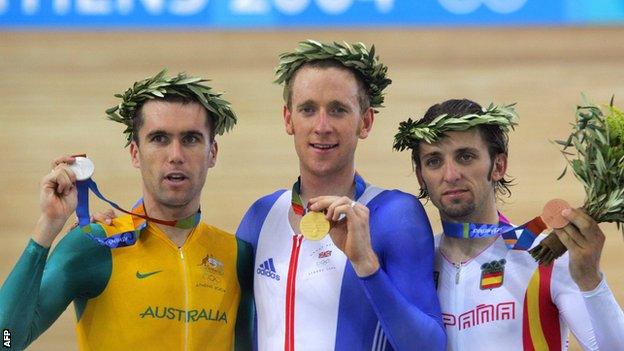
He also won silver and bronze medals to become the first Briton to win three medals at the same Olympics for 40 years
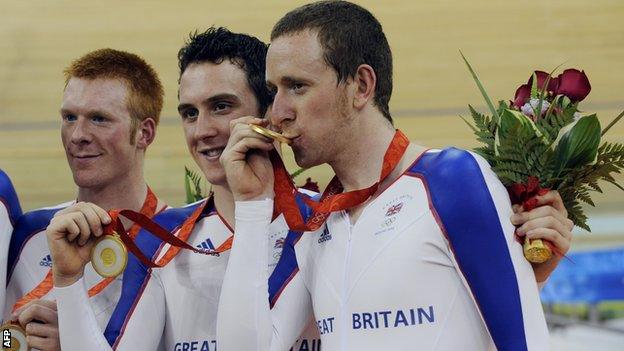
Two more gold medals followed in Beijing 2008 with individual and team pursuit victories - the second, with a youthful Geraint Thomas in the team
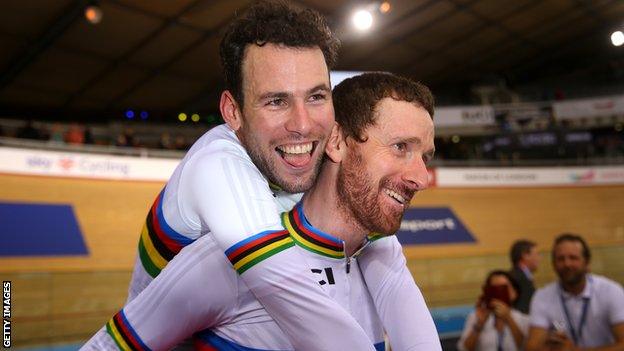
Wiggins won two madison world titles on the track with Mark Cavendish - in 2008 and 2016 - and helped him win the 2011 road race title
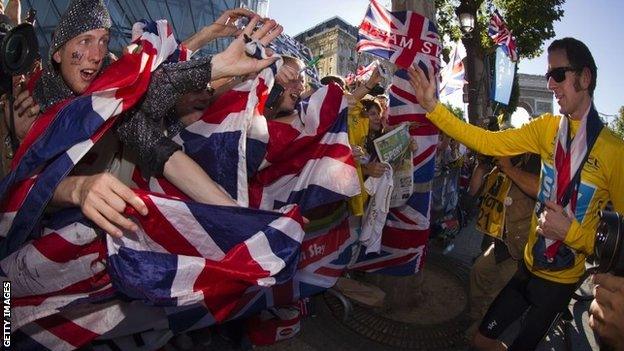
A corner of Paris turned into little Britain to celebrate Wiggins' sensational 2012 Tour de France win...
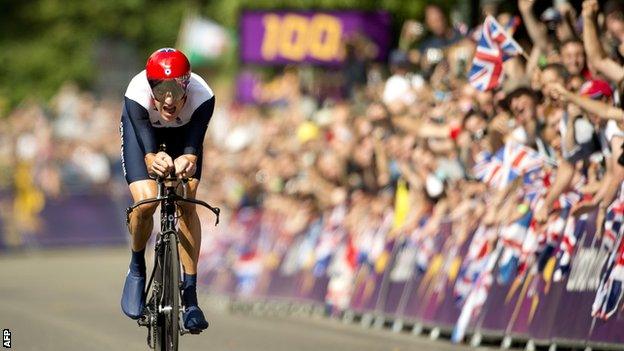
...and 10 days later thousands more cheered him on to time trial gold in London

A world time trial title on the road followed in 2014 before a return to the track, and a tilt at the hour record
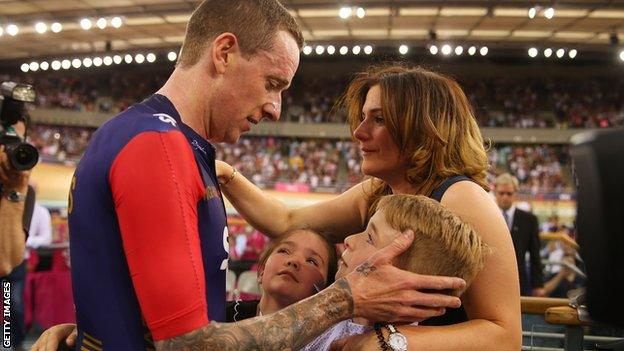
Wiggins broke fellow Briton Alex Dowsett's mark and celebrated with his wife Cath, son Ben and daughter Isabella
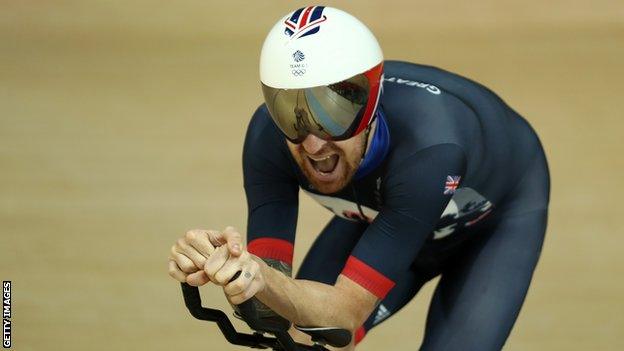
And the fairytale ending was completed in Rio with victory in the team pursuit...
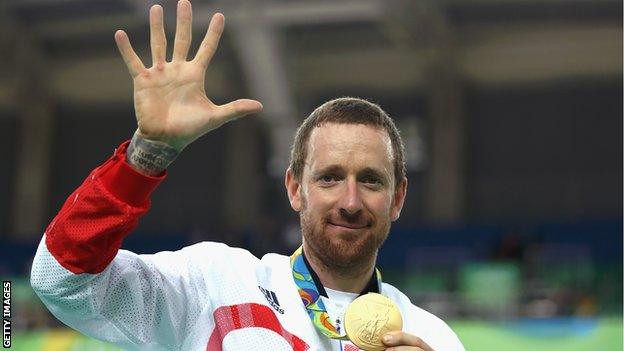
...before Wiggins reminded us all just how many Olympic gold medals he has won
Graphics
- Published28 December 2016
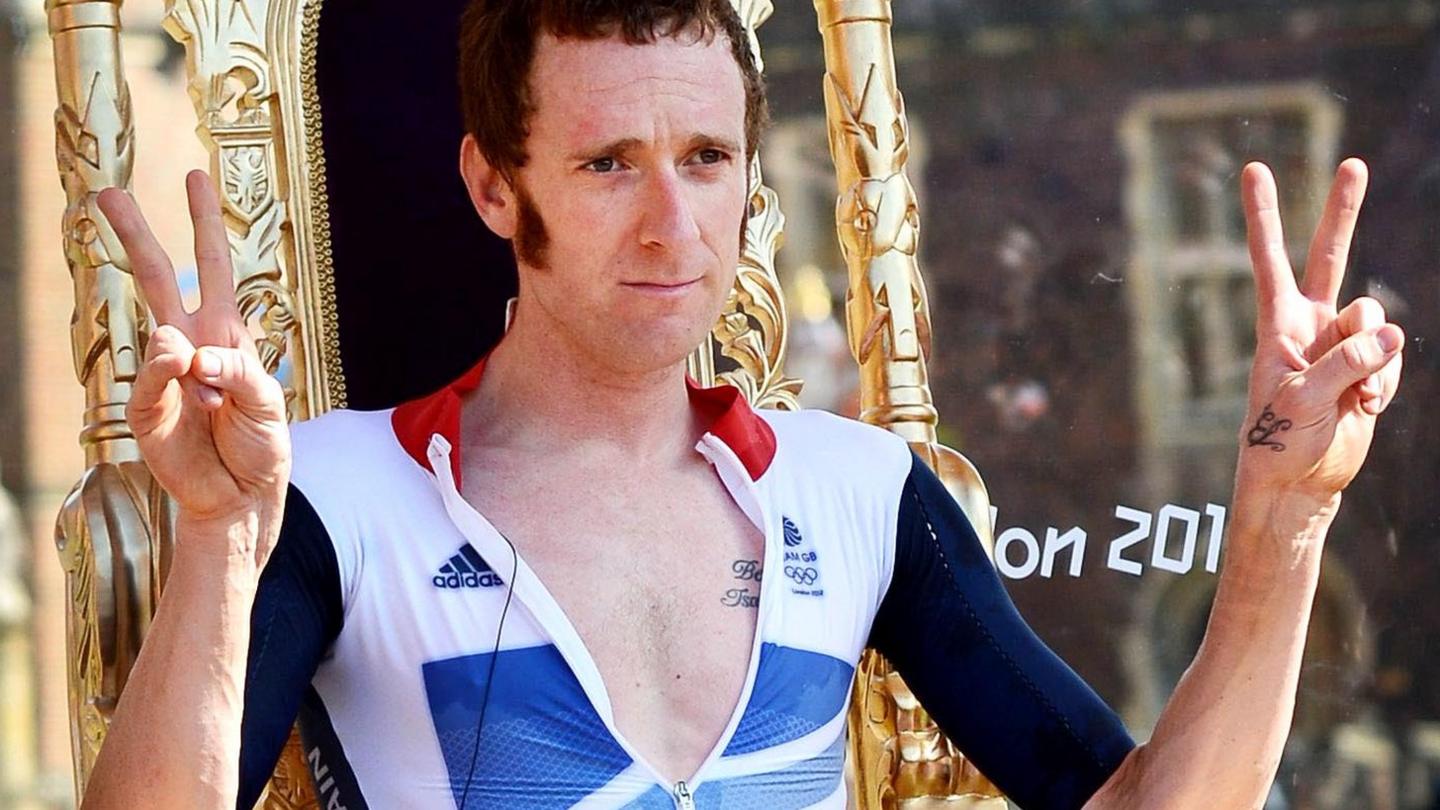
- Published28 December 2016
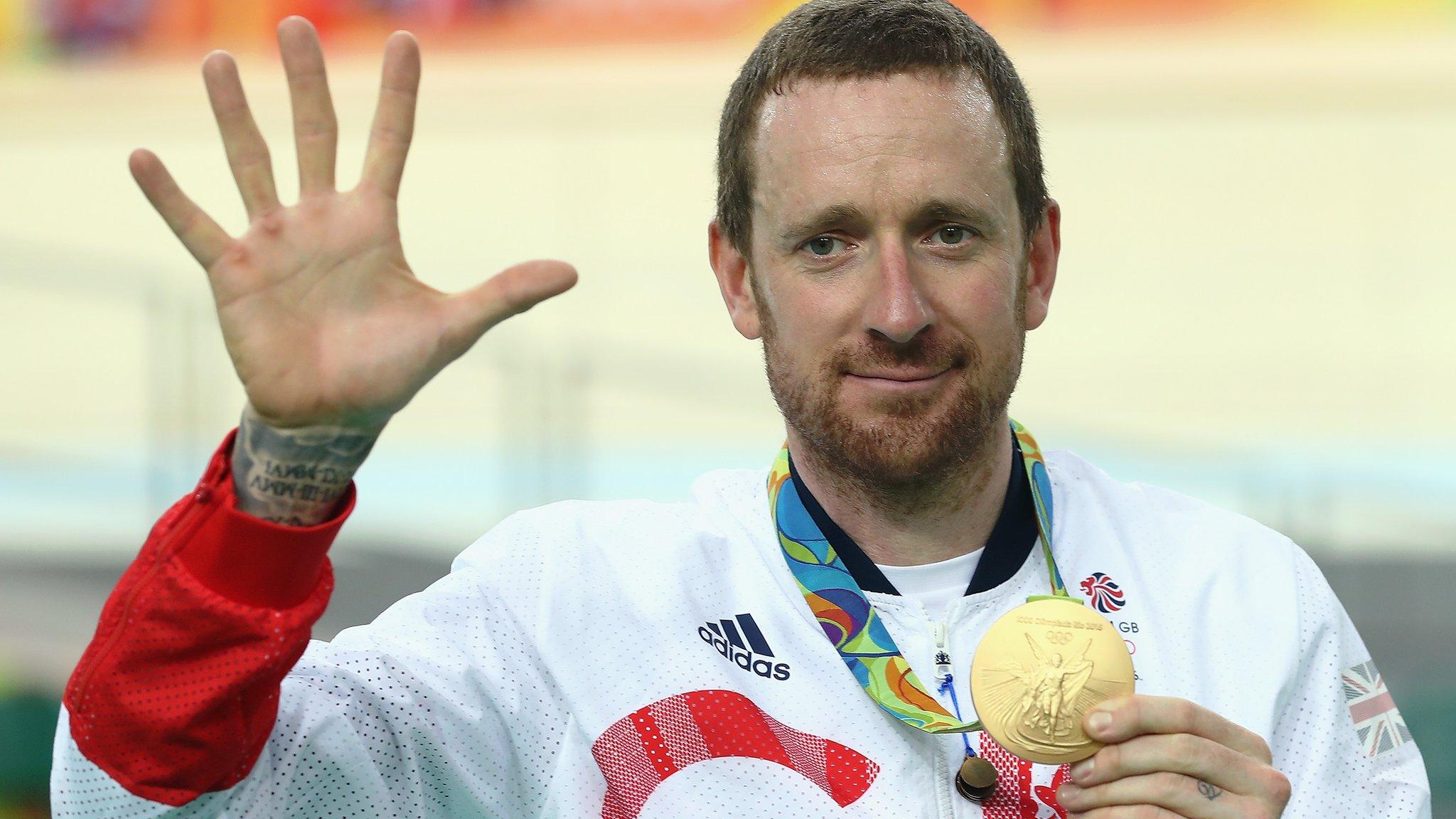
- Published13 August 2016
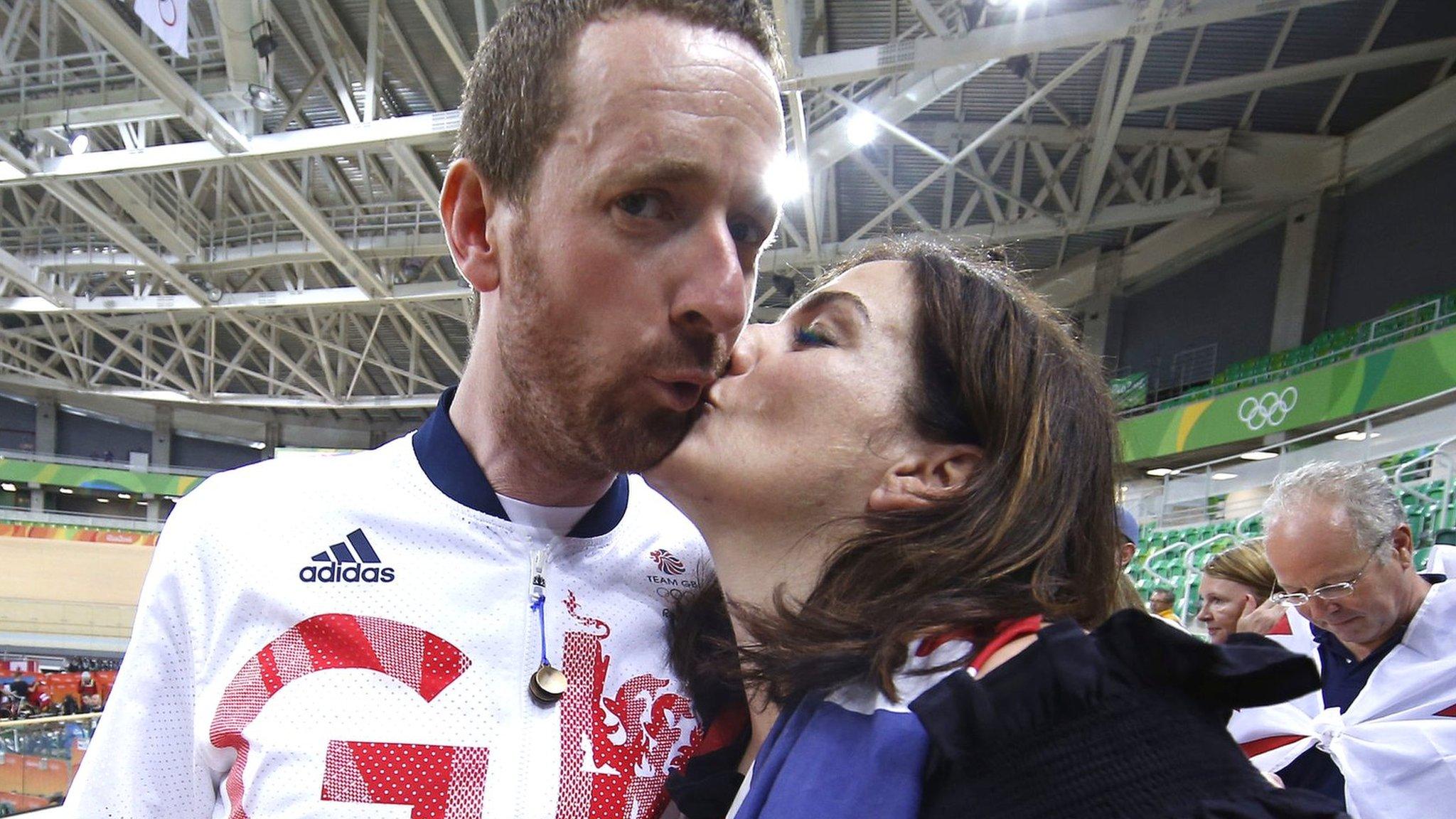
- Published13 August 2016
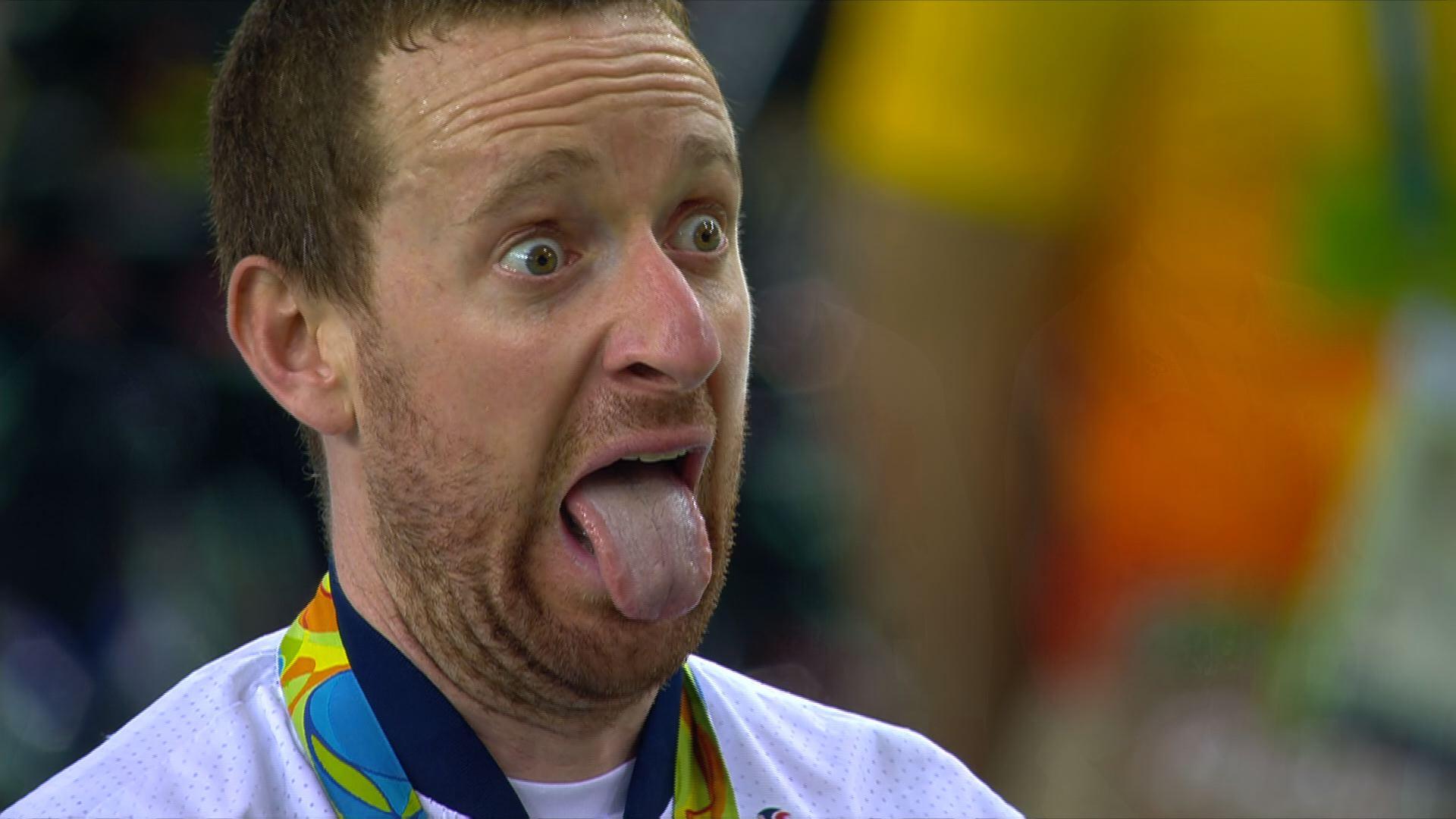
- Attribution
- Published11 August 2016
